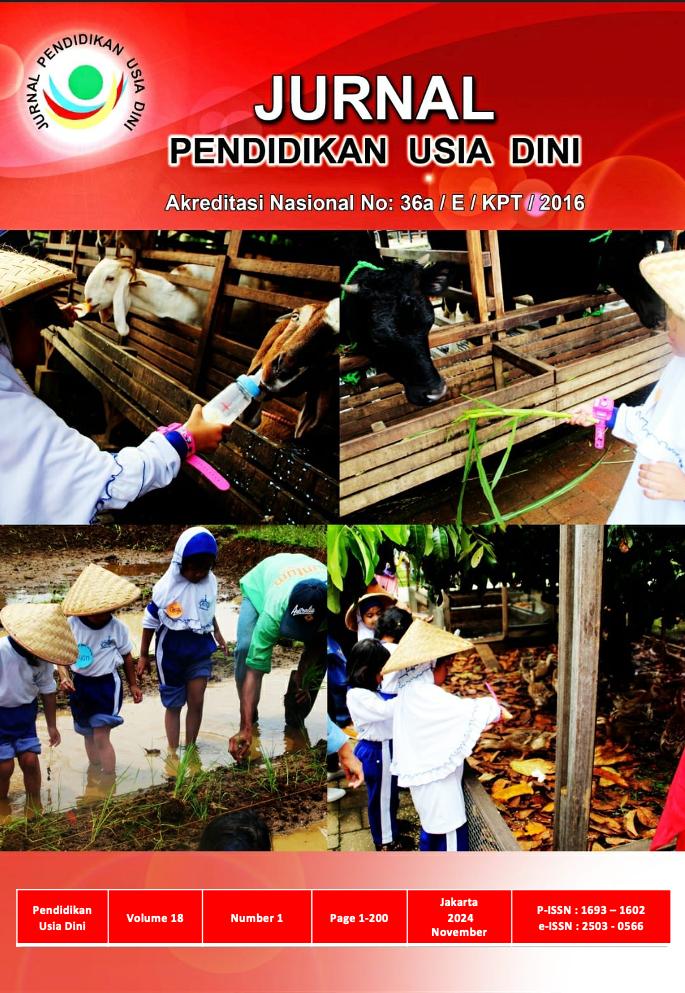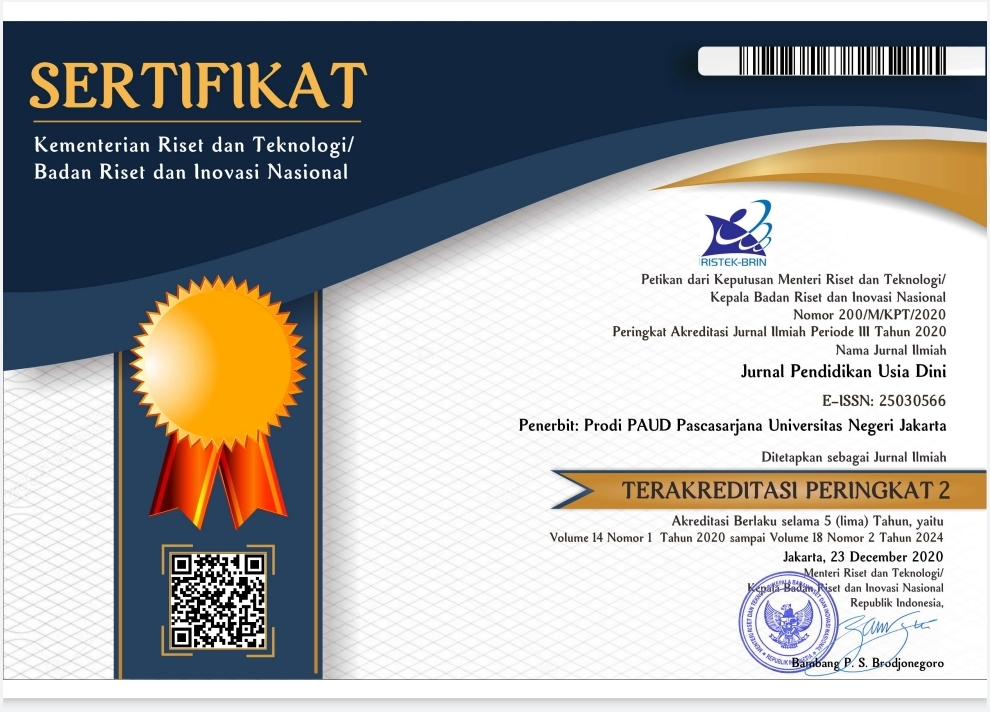Parental Role: Internalization of the Development of Independent, Disciplined, and Responsible Character Values for Children Aged 5-6 Years
DOI:
https://doi.org/10.21009/JPUD.181.02Abstract
Parents play a crucial role in shaping the character of their children, and the character of children is closely tied to the involvement of both parents. This study aims to examine how parents function as educators, motivators, role models, controllers, and providers (facilitators) in cultivating character values, discipline, and responsibility in children. The research was conducted using qualitative methods with a sequential and phenomenological approach. Photovoice, combined with thematic analysis, served as the type and source of data. Data collection involved interviews and observations, with six pairs of parents with 5-6-year-old children participating in the study. The analysis revealed that parents, through their various roles, internalize the development of independent, disciplined, and responsible character values in their children. The study concludes that children aged 5-6 exhibit character values learned through a process of observation and imitation. Future research is encouraged to utilize these findings as a reference for instilling character values in children.
Keywords: character value, early childhood, parental role
References:
Adawiah, A., Asmini, A., Umar, A., & Abdu, W. J. (2023). The Influence of Parenting Styles and Managerial Elements on School Readiness in Kindergarten-Aged Children within a Community. Jurnal Obsesi : Jurnal Pendidikan Anak Usia Dini, 7(5). https://doi.org/10.31004/obsesi.v7i5.5154
Andhika, M. R. (2021). Peran Orang Tua Sebagai Sumber Pendidikan Karakter. At-Ta’dib: Jurnal Ilmiah Prodi Pendidikan Agama Islam, 13(1), 73–81.
Anggraeni, R. N., Fakhriyah, F., & Ahsin, M. N. (2021). Peran orang tua sebagai fasilitator anak dalam proses pembelajaran online di rumah. Jurnal Ilmiah Pendidikan Dasar, 8(2), 105. https://doi.org/10.30659/pendas.8.2.105-117
Boiliu, E. R. (2023). Dimensi Pengembangan Pendidikan Karakter bagi Anak Usia Dini. Real Kiddos: Jurnal Pendidikan Anak Usia Dini, 1(2). https://doi.org/10.53547/realkiddos.v1i2.358
Choi, H. S., Lee, S., & Seo, E. (2024). Influence of perceived parental child-rearing attitudes and ego identity on college adjustment among Korean nursing students. BMC Nursing, 23(1). https://doi.org/10.1186/s12912-023-01643-9
Choi, O. joo, Choi, J., & Kim, J. ho. (2020). A longitudinal study of the effects of negative parental child-rearing attitudes and positive peer relationships on social withdrawal during adolescence: an application of a multivariate latent growth model. International Journal of Adolescence and Youth, 25(1). https://doi.org/10.1080/02673843.2019.1670684
D’Souza, J., & Gurin, M. (2016). The universal significance of Maslow’s concept of self-actualization. In Humanistic Psychologist (Vol. 44, Issue 2). https://doi.org/10.1037/hum0000027
Effendi, Y. (2020). Pola Asuh dan Aktualisasi Diri: Suatu Upaya Internalisasi Konsep Humanistik dalam Pola Pengasuhan Anak. SOSIOHUMANIORA: Jurnal Ilmiah Ilmu Sosial Dan Humaniora, 6(2), 13–24. https://doi.org/10.30738/sosio.v6i2.6781
Epstein, J. L. (2018). School, family, and community partnerships: Preparing educators and improving schools, second edition. In School, Family, and Community Partnerships: Preparing Educators and Improving Schools, Second Edition. https://doi.org/10.4324/9780429494673
Eslava, M., Deaño, M., Alfonso, S., Conde, Á., & García-Señorán, M. (2016). Family context and preschool learning. Journal of Family Studies, 22(2). https://doi.org/10.1080/13229400.2015.1063445
Ferdiansyah, S., Supiastutik, & Angin, R. (2020). Thai students’ experiences of online learning at indonesian universities in the time of the covid-19 pandemic. Journal of International Students, 10(Special Issue 3), 58–74. https://doi.org/10.32674/jis.v10iS3.3199
Fiskerstrand, A. (2022). Literature review – Parent involvement and mathematic outcome. In Educational Research Review (Vol. 37). https://doi.org/10.1016/j.edurev.2022.100458
Fono, Y. M., Fridani, L., & Meilani, S. M. (2019). Kemandirian dan Kedisplinan Anak yang Diasuh oleh Orangtua Pengganti. Jurnal Obsesi : Jurnal Pendidikan Anak Usia Dini, 3(2). https://doi.org/10.31004/obsesi.v3i2.245
Fuadia, N. N. (2020). Parenting Strategy for Enhancing Children’s Self-Regulated Learning. JPUD - Jurnal Pendidikan Usia Dini, 14(1). https://doi.org/10.21009/141.08
Glatz, T., Özdemir, S. B., & Boersma, K. (2022). Parental Child-Invested Contingent Self-Esteem as a Source of Acculturation-Related Parent–Child Conflicts Among Latino Families. Journal of Family Issues, 43(7). https://doi.org/10.1177/0192513X211030044
Gunawan, N. A., Nurwati, N., & Sekarningrum, B. (2020). Analisis Peran Gender dalam Pengasuhan Anak pada Keluarga Etnis Jawa dan Sunda di Wilayah Perbatasan. JUPIIS: JURNAL PENDIDIKAN ILMU-ILMU SOSIAL, 12(1). https://doi.org/10.24114/jupiis.v12i1.15568
Harris, K. I. (2021). Parent Cooperative Early Childhood Settings: Empowering Family Strengths and Family Engagement for All Young Children. International Journal of Contemporary Education, 4(1). https://doi.org/10.11114/ijce.v4i1.5143
Hart, P. (2022). Reinventing character education: the potential for participatory character education using MacIntyre’s ethics. Journal of Curriculum Studies, 54(4). https://doi.org/10.1080/00220272.2021.1998640
Hidayat, M., Rozak, R. W. A., Hakam, K. A., Kembara, M. D., & Parhan, M. (2022). Character education in Indonesia: How is it internalized and implemented in virtual learning? Cakrawala Pendidikan, 41(1). https://doi.org/10.21831/cp.v41i1.45920
Holiseh, H., Satispi, E., & Gusman, D. T. (2023). Strategi Komunikasi BKKBN (Badan Koordinasi Keluarga Berencana Nasional) Melalui Program Keluarga Berencana. Jurnal Akuntan Publik, 1(2).
Ihmeideh, F., AlFlasi, M., Al-Maadadi, F., Coughlin, C., & Al-Thani, T. (2020). Perspectives of family–school relationships in Qatar based on Epstein’s model of six types of parent involvement. Early Years, 40(2). https://doi.org/10.1080/09575146.2018.1438374
Liana, H., Rahardjo, B., & Sjamsir, H. (2018). Implementasi Pembelajaran Karakter Anak Usia Dini Di Paud Anak Kita Preschool Samarinda. Pendas Mahakam : Jurnal Pendidikan Dan Pembelajaran Sekolah Dasar, 3(1), 8–19. Retrieved from https://jurnal.fkip-uwgm.ac.id/index.php/pendasmahakam/article/view/222
Marliyanti, Rahardjo, B., & Rozie, F. (2020). Penerapan Penanaman Nilai-Nilai Karakter Melalui 9 Pilar Karakter Anak Usia 5-6 Tahun di TK Hidayah Samarinda. Jendela Bunda, 7(2).
Mayasari, A., Sopian, A., Ridwan, W., Hasanah, A., & Arifin, B. S. (2022). Pengembangan Model Evaluasi Pendidikan Karakter dalam Pembelajaran di Sekolah. JIIP - Jurnal Ilmiah Ilmu Pendidikan, 5(7). https://doi.org/10.54371/jiip.v5i7.676
Mubarok, M. N. (2021). Manajemen Internalisasi Nilai Karakter Anak Usia Dini di Lingkungan Keluarga. El-Athfal : Jurnal Kajian Ilmu Pendidikan Anak, 1(02), 64–80. https://doi.org/10.56872/elathfal.v1i02.275
Mujahidah. (2015). Implementasi Teori Ekologi Brofenbrenner Dalam Membangun Pendidikan Karakter yang Berkualitas. Lentera, 19(2).
Munthe, E., & Westergård, E. (2023). Parents’, teachers’, and students’ roles in parent-teacher conferences; a systematic review and meta-synthesis. In Teaching and Teacher Education (Vol. 136). https://doi.org/10.1016/j.tate.2023.104355
Purnomo, E. N., Imron, A., Wiyono, B. B., Sobri, A. Y., & Dami, Z. A. (2024). Transformation of Digital-Based School Culture: implications of change management on Virtual Learning Environment integration. Cogent Education, 11(1). https://doi.org/10.1080/2331186X.2024.2303562
Rajab, A., & Wright, N. (2018). Government constructions of the pedagogical relationship between teachers and children in Saudi preschool education: issues of adoption or adaptation? Pedagogy, Culture and Society, 26(4). https://doi.org/10.1080/14681366.2018.1427140
Ramadhini, F. (2022). Pemikiran Ibnu Qayyim Al Jauziyyah Tentang Pendidikan Anak Usia Dini. Darul Ilmi: Jurnal Ilmu Kependidikan Dan Keislaman, 9(2), 196–209. https://doi.org/10.24952/di.v9i2.4741
Russell, S., Bird, A. L., McNamara, J., & Herbert, J. S. (2023). Exploring the relationship between parent mental health and parent–child emotion reminiscing. Early Child Development and Care, 193(7). https://doi.org/10.1080/03004430.2023.2174980
Russo, C., Decataldo, A., & Terraneo, M. (2021). The effect of parental roles on mental health outcomes of unemployment: a gender perspective. International Journal of Sociology and Social Policy, 41(13–14). https://doi.org/10.1108/IJSSP-04-2021-0093
Shodiq, S. F. (2021). Pengaruh Kepekaan Sosial terhadap Pengembangan Pendidikan Karakter Berbasis Masyarakat. Jurnal Basicedu, 5(6). https://doi.org/10.31004/basicedu.v5i6.1698
Suciati, I., Idrus, I., Hajerina, H., Taha, N., & Wahyuni, D. S. (2023). Character and moral education-based learning in students’ character development. International Journal of Evaluation and Research in Education, 12(3). https://doi.org/10.11591/ijere.v12i3.25122
Vessuri, H., & Canino, M. V. (1996). Sociocultural dimensions of technological learning. Science, Technology and Society, 1(2). https://doi.org/10.1177/097172189600100208
Wei, F., & Ni, Y. (2023). Parent councils, parent involvement, and parent satisfaction: Evidence from rural schools in China. Educational Management Administration and Leadership, 51(1). https://doi.org/10.1177/1741143220968166
Winship, M., Standish, H., Trawick-Smith, J., & Perry, C. (2021). Reflections on practice: providing authentic experiences with families in early childhood teacher education. In Journal of Early Childhood Teacher Education (Vol. 42, Issue 3). https://doi.org/10.1080/10901027.2020.1736695
Yulianti, E. S., Afifah, K., Lestari, E., Sjamsir, H., Pertiwi, A. D., Mulawarman, U., Timur, K., & Sjamsir, H. (2022). Peran Extended-Nuclear Family terhadap Perkembangan Bahasa Anak Usia Dini. Indonesian Journal of Islamic Early Childhood Education, 7(2).
Downloads
Published
How to Cite
Issue
Section
License
Copyright (c) 2024 Hasbi Sjamsir, Fachrul Rozie, Safnah Ayu Dewi, Heppy Liana

This work is licensed under a Creative Commons Attribution 4.0 International License.
JURNAL PENDIDIKAN USIA DINI work is licensed under a Creative Commons Attribution 4.0 International License. (http://creativecommons.org/licenses/by/4.0/)





